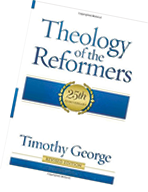Back to series
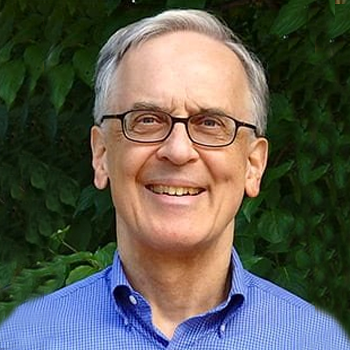

Recommended Reading:
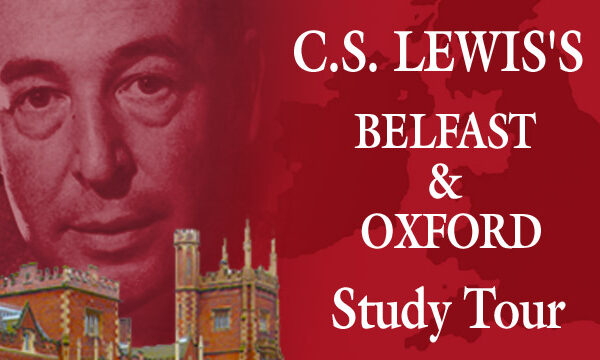
The Legacy Of John Hus
Click here to open a Print - Friendly PDF
At the center of the spacious Old Town Square in Prague stands the John Hus1 monument. This massive statue, erected in 1915, commemorated the five-hundredth anniversary of the great Czech reformer’s death. His notable words are inscribed around the base of this monument: “Love each other and wish the truth to everyone.”
This has often been succinctly summarized as “the truth prevails!” The year 2015 marked the six-hundredth anniversary of Hus’s martyrdom and provides an important reminder of his life and ministry. Yet many people hardly recognize his name or his substantial contributions to the church and the Christian life.
John Hus (c. 1372–1415) was a pastor and church reformer born into poverty in southern Bohemia. He was educated at the University of Prague, now known as Charles University, and received his master’s degree in 1396.
He became a faculty member that same year and taught until 1412. Hus served as both dean of the faculty and later rector at the university. During this early formative period, Hus read the writings of the English reformer John Wycliffe.
While Hus identified with the Augustinian theology of Wycliffe and was indebted to his thinking, especially on the nature of the church, nearby Bohemian writers also inspired Hus.
 In 1402 Hus took on an additional role, as pastor at the Bethlehem Chapel, the center of the growing Bohemian Reform movement. Significantly, the name Bethlehem was chosen for its meaning, “house of bread.” The chapel was established as a site for preaching in the vernacular rather than the traditional Latin.
In 1402 Hus took on an additional role, as pastor at the Bethlehem Chapel, the center of the growing Bohemian Reform movement. Significantly, the name Bethlehem was chosen for its meaning, “house of bread.” The chapel was established as a site for preaching in the vernacular rather than the traditional Latin.
This was a period of rampant immorality and corruption among the priests and officials within the Western Catholic Church. Hus’s sermons frequently addressed the corruptions, most notably the ancient ongoing practice of simony or the purchasing of church offices.
Wealthy parents and others would secure ecclesiastical positions to ensure the lucrative and stress-free livelihoods for their sons.
Not surprisingly, these men rarely took their leadership seriously, creating a spiritual vacuum. Hus’s messages, marked by spiritual zeal, also addressed critical issues of moral purity, including priestly celibacy and the abuse of indulgences, often angering the clergy and church hierarchy.
Unfortunately, similar to the situation with John Calvin, we know little of Hus’s personal life, including specifics about his conversion.
However, at some point early in his ministry, Hus was convicted by the truth claims of Scripture and thereafter stressed the importance of obeying the pope or church decrees only to the extent that they agreed with Scripture.
The best window into Hus’s inner life and motivation is through his letters. Repeatedly he reminded his friends, “We ought to obey God rather than men.”2 These are the words of Peter from Acts 5:29. Hus’s resistance to following the teachings of the Church further irritated the leadership and brought frequent condemnation and led to his excommunication.
After his fourth excommunication, Hus voluntarily went into exile from 1412 to 1414 and lived among wealthy nobility in southern Bohemia.
During this period, he wrote numerous books, including his most influential treatise on the church, De Ecclesia, written in 1413. Other major writings included On Simony, expositions on the Apostles’ Creed, the Ten Commandments, and the Lord’s Prayer, and a short devotional work known as The Daughter, or How to Know the Correct Way to Salvation.
This was penned for a community of women, known by Hus through one of his friends. In 1414 Hus agreed to travel to Constance, Germany, to attend the council that had been convened to deal with him, but also to resolve the embarrassing dilemma of the multiple popes; 1378 had marked the beginning of the Great Schism in which initially two and eventually three rival popes fought for exclusive supremacy.
Hus’s teaching had been condemned as heretical, and he naively thought he would have the opportunity to defend himself before the learned doctors of the church.
Instead he was imprisoned and later condemned as a follower of Wycliffe. After frequent attempts to coerce Hus to recant, he was removed from the priesthood and burned at the stake on July 6, 1415, charged with being an obstinate heretic.
The Protestant Reception of John Hus
As early as Martin Luther, prominent Protestants have embraced the teachings of Hus. Luther’s perception of Hus was marked by growing appreciation and deep respect. His original rejection of Hus was transformed when in his monastery library he discovered—and was astonished by—some sermons by Hus.
Luther shocked his opponents with his growing approval of Hus. This led to Luther’s famous confession in February 1520: “I have taught and held all the teachings of Jan Hus, but thus far did I not know it . . . In short, we are all Hussites and did not know it.”3 More recent examples illustrate the continuing Protestant approval of Hus. Harry Emerson Fosdick’s Great Voices of the Reformation, written in 1952, singles out, as being critically important, Hus’s dedication to the Bible. He writes:
Behind all else in Huss’ teaching stood his devotion to the Scriptures as the ultimate guide of life and thought. Here we run decisively upon one of the major issues dividing Roman Catholicism from the whole movement which issued in the Protestant Reformation. According to Roman dogma one did not believe in the church because Scriptures say so, but believed in the Scriptures because the church says so.4
Even more amazing are the authors that claim Hus to be an “evangelical.” David Otis Fuller’s Valiant for the Truth: A Treasury of Evangelical Writings (1961) incorporates a section from Hus’s work on the church. Hus clearly satisfies the prerequisite for this volume that “each man possessed the same fierce conviction––that all truth is absolute, never relative . . . in theology, their absolute authority was the Bible.”5
In the same year, James McGraw wrote Great Evangelical Preachers of Yesterday. This book begins with Wycliffe and moves to Hus and Luther. McGraw’s definition of evangelical reflects greater precision. For him
the term “evangelical” means “preaching the good news”…Such preaching as was done by the subjects studied in this book was not bound by form or method, but was guided by need. It was done for a purpose––the exaltation of Christ and the nurture of faith in his power to save.6
Later he adds, “Wycliffe and Hus seemed to be good subjects with which to begin. They represent the preaching which awakened interest and focused attention upon truths Luther and the others were able to portray during the Reformation times.”7
Timothy Larsen has also included Hus in his highly regarded reference work, Biographical Dictionary of Evangelicals (2003). His classification was based on David Bebbington’s well-accepted definition of evangelicals (i.e., conversion, Scripture, cross, and activism) that places the origin for this movement in the 1730s.
Though Larsen quickly adds, “Nevertheless, the inclusion of a ‘pre-history’ of evangelical forebears was thought to be useful—those by whose work evangelicals have often been shaped and with whose examples they have identified.” Larsen’s inclusionary decisions were also determined by individuals’ significance of influence, and this “book has been biased towards figures who have had a substantial impact in the wider evangelical movement.”8
Regardless of this strong Protestant identification with Hus, we must be honest and realize that Hus was certainly not a Protestant! Thomas Fudge, the foremost English-speaking scholar on Hus, articulates it more firmly: “Jan Hus was a medieval Catholic reformer rather than a premature Protestant.”9 Hus held to the traditional Western Catholic teachings on transubstantiation, belief in purgatory, and intercession to the Virgin Mary.10 Yet Hus was a significant reformer and has much to teach the contemporary church about how to live and follow Jesus.
John Hus’s Message for Today
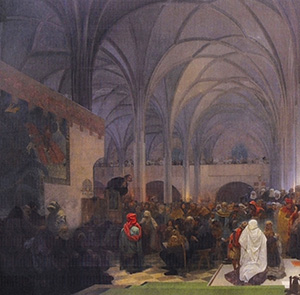 First, Hus would challenge us to be grounded in Scripture. Writing to his friends in Bohemia the day before he was executed, he declared what was a constant reminder throughout his ministry: “Be diligent in the Word of God.”11 Instead of being diligent, we are often distracted and inattentive to the Word of God.
First, Hus would challenge us to be grounded in Scripture. Writing to his friends in Bohemia the day before he was executed, he declared what was a constant reminder throughout his ministry: “Be diligent in the Word of God.”11 Instead of being diligent, we are often distracted and inattentive to the Word of God.
Reading habits of many contemporary followers of Jesus are embarrassing. But our condition is even more disappointing when we compare the behavior of Christians with that of unbelievers and recognize how little observable difference sets us apart.
Hus speaks personally that Scripture has been his “foundation and food, by which my spirit is refreshed, that it may be strong against all adversaries of the truth.”12
This is why he hungered after the Word and encouraged his friends to be equally zealous and conformed to its teachings, and always to “stand firmly in the love of the Word of God, and cleave to it with the greatest desire.”13
Hus would certainly affirm the name of this periodical: Knowing & Doing. Beyond his emphasis on knowing Scripture, he practiced and exhorted “doing” and living out its truth. He wrote to his friends at Prague with great urgency: “I beg you…that you gladly attend the preaching, diligently hear it; and hearing it, understand it; and understanding it, keep it; and keeping it, learn to know yourselves; and learning to know yourselves, know rightly your dearest Saviour.”14
This strong reliance upon hearing the Word created an equal responsibility on preachers, and Hus urged them to be likewise diligent in their preaching. He was deeply grieved during his exile when he was unable to preach and candidly confessed that “I preach the sacred Scriptures––not I, but principally the Holy Spirit.”15
There is considerable scholarly debate regarding the extent of Hus’s contribution to the revisions of the Czech Bible; he was involved at some level, providing increased access for the common person. Hus devoted himself, much like Luther and Calvin later, to study the Scriptures and discover the truth.
A second challenge from Hus is to keep Jesus Christ as the head of the church. Hus formulated his understanding of the nature and purpose of the church from Scripture, in particular the writings of the apostle Paul, through the lens of Augustine. For Hus the church was the gathering of all predestined believers in heaven and earth who confessed their faith in the Lord Jesus Christ and not a corporation of people controlled by the pope or church councils.
However, if the church leadership followed Scripture, Hus would gladly conform to its teachings: “Whatever the holy Roman Church or the pope with the cardinals shall decree or order to be held or done according to the law of Christ, that I, humbly and as a faithful Christian, wish to respect and reverently to accept.”16
Hus’s understanding of the nature of the church also emphasized true inner convictions rather than a polished external veneer, portrayed in the Pharisees of Jesus’ day.
His communal emphasis on the church seems foreign to much of our American individualized practice, which has contributed to the secularization of the body of Christ. Instead of cooperating with other Christians, even within our own denominations or close-knit associations, we tend to divide from one another.
Inherent within Hus’s teaching on the church is the principle of consistency. Hus struggled with following the decrees of the pope who “lived contrary to Christ” who was “the supreme head” of the church.
17 Here again, Hus would proclaim the critical need to know and defend the truth. While Hus was a reformer, he recognized that his desired goal of church unity was possible only through true faith that was elusive if church-goers were not devoted to Scripture.
As we critique programs or ministries today, we likewise can be challenged to base our actions on Scripture and not personal power or pride.
Third, Hus recognized the centrality of worship to connect people to God. This would become more developed in Luther’s teaching on the priesthood of all believers, intended to increase the person’s focus on God. Unfortunately there is a trend today in many churches to create a more horizontal focus in public worship.
Hus would be alarmed to discover that more time is devoted to announcements than the reading of Scripture in a representative cross section of churches.18 A similar diminishment of prayer is also detected in some worship experiences.
Likewise, musically, large robed choirs presenting polished oratorios or high-powered pulsating praise bands can divert the proper focus from God to the singers or the worshipers who feel the performance is for their benefit. Hus desired to increase participation and create a vertical flow of worship by preaching and translating the liturgy and hymns into the vernacular, allowing the people to participate more fully.
During this period, only the priest received the wine while the laypeople were limited to receiving the Eucharistic bread. Central to the Czech Reformation that followed Hus’s death was to return the cup to the laity. This was symbolized by a chalice placed on an open Bible, communicating the free proclamation of Scripture and the celebration of the Lord’s Supper with both bread and wine. Hus’s motivation again was derived from Scripture.
In writing to his replacement at the Bethlehem Chapel, Hus asserted: “Do not oppose the sacrament of the cup of the Lord which the Lord instituted through Himself and through His apostle [i.e., Paul]. For no Scripture is opposed to it, but only a custom which I suppose has grown up by negligence. We ought not [to] follow custom, but Christ’s example and truth.”19
Fourth, another important challenge from Hus concerns cultivating the spiritual life. He would have been shocked to discover our contemporary gap in understanding between the nominal term Christian and a disciple who seriously dedicates his or her life to following Jesus.20
Speaking to one of his closest friends and supporters, Hus exhorted him to “firmly and steadfastly love the Lord Jesus Christ,” noting that Christ suffered and provided this as an example in following Him.
After citing, “If anyone would come after me, let him deny himself and take up his cross and follow me” (Luke 9:23 ESV), Hus frankly confessed something that any honest disciple recognizes: “O most kind Christ, draw us weaklings after Thyself, for unless Thou draw us, we cannot follow Thee!”21
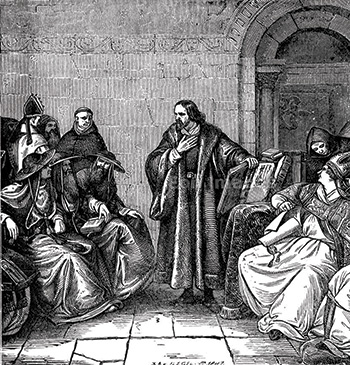 Jesus’ earthly years serve as a model; believers are to “follow Christ’s life in poverty, purity, humility.” Realizing the realities of persecution for the truth, he writes less than a month before his death: “Do not fear to die for Christ if you wish to live with Christ.” Similarly Hus asserted, “It is better to die well than to live wickedly.”22
Jesus’ earthly years serve as a model; believers are to “follow Christ’s life in poverty, purity, humility.” Realizing the realities of persecution for the truth, he writes less than a month before his death: “Do not fear to die for Christ if you wish to live with Christ.” Similarly Hus asserted, “It is better to die well than to live wickedly.”22
Given the unrestrained immorality and corruption among some priests and other church leaders, Hus’s emphasis on following the Ten Commandments is understandable. Whether he is writing to priests or lay people, he exhorts all to “live a devout and holy life.”23
Additionally Hus, reminiscent of Jesus, warns against constructing the exterior of your house without similar attention to your soul. This is reinforced by the ethical mandate “that if you are a builder of a spiritual building, [be] kind to the poor and humble.”24
Beyond the continual message of reading Scripture and seeking to live out that truth, Hus mentions the importance of praying devoutly, especially using the Psalms, to cultivate the spiritual life.25
Hus is also pastoral and realistic when he writes that the Christian life is a journey: “Always keep in mind what you are, what you were, and what you will be.”26
Fifth, Hus would be very quick to warn us of the reality of temptation. Many people seem unaware of the formative nature of culture. We naively think that our environment is neutral when actually it is continually shaping us in ways that are typically opposed to the gospel.
Hus preached against seeking wealth for its own sake and ignoring the needs of the poor. In writing to an unnamed monk, he reminded him that “the basic rule for clerics concerning the owning of property, particularly those who have vows, is to possess all things in common, according to Acts 2: ‘They had all things in common.’”
In the same letter, he marshals support from “blessed Bernard” [of Clairvaux] who declared: “A monk owning a farthing, is not worth a farthing.”27 The Bohemian reformer reveals his pastoral wisdom in writing to two friends.
He first counsels them to perceive “how the wheel of worldly vanity spins.” Initially it may lift a person with the fleeting pleasures of sin but soon after crushes that person to destruction that can, if unchecked, lead to “eternal torment in fire and darkness.”28
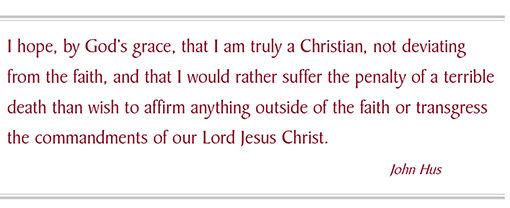 Often Hus would speak of the three traditional categories of the world, the flesh, and the devil and the necessity for Christians to be vigilant and persevere in the face of such seductive temptations.
Often Hus would speak of the three traditional categories of the world, the flesh, and the devil and the necessity for Christians to be vigilant and persevere in the face of such seductive temptations.
On other occasions he was more explicit in naming specific temptations. For example, in an epistle to an unknown priest, Hus counsels him to preach fervently “against debauchery, for that is the most ferocious beast which devours men for whom Christ’s humanity suffered” and that further he should “guard himself against fornication.”
He concludes this letter on spiritual combat by declaring: “Whatever you do, fear God and keep His commandments. You will thus walk rightly and not perish, tame the flesh, spurn the world, vanquish Satan, put on God, find life, confirm others.”29
Hus learned this personally, through the school of affliction, that suffering and temptation can arise at any moment. Among other things, he faced the heart-wrenching sense of betrayal when some of his one-time close friends in his ministry became his most vociferous accusers at Constance.
Throughout his varied experiences, Hus always placed his hope in God. Writing to his close associate just two weeks before his execution, Hus affirmed: “God almighty will strengthen the hearts of His faithful whom He has chosen before the foundation of the world that they may receive the unfading crown of glory.”30
Clearly the life and teaching of John Hus was significant not only for Luther and other early Protestants, but also for us today. It is fitting to conclude with the famous words for which Hus is often remembered: “Therefore faithful Christian, seek the truth, listen to the truth, learn the truth, love the truth, speak the truth, adhere to truth and defend truth to the death.”31
Notes:
1 Czech and European writers typically refer to Hus as Jan Hus. Most Americans call him John Hus or Huss. I will follow the lead of most American publications and use Hus.
2 Matthew Spinka, trans., Letters of John Hus (Totowa, NJ: Rowman and Littlefield, 1972), 51, cf. 53, 36, etc.
3 Ľubomír Batka, “Jan Hus’ Theology in a Lutheran Context,” Lutheran Quarterly 23 (2009): 1. Luther’s approval is further demonstrated by the prefaces he wrote for various editions of Hus’s writings. Martin Luther, Luther’s Works: Sermons on the Gospel of St. John chapters 17–20, ed. Christopher Boyd Brown, vol. 69 (St. Louis: Concordia, 1958), 25 n 53.
4 Harry Emerson Fosdick, ed., Great Voices of the Reformation: An Anthology (New York: Random House, 1952), 40. Huss chapter at 37–65.
5 David Otis Fuller, ed., Valiant for the Truth: A Treasury of Evangelical Writings (New York: McGraw-Hill, 1961), ix. Huss chapter at 81–92.
6 James McGraw, Great Evangelical Preachers of Yesterday (New York: Abingdon, 1961), 7, 8. Huss chapter at 19–23.
7 Ibid., 9.
8 Timothy Larsen, ed., Biographical Dictionary of Evangelicals (Downers Grove, IL: InterVarsity, 2003), 1. Hus entry at 321–22.
9 Thomas Fudge, “Hussite Theology and the Law of God,” in The Cambridge Companion to Reformation Theology, ed. David Bagchi and David C. Steinmetz (Cambridge: Cambridge University Press, 2004), 25.
10 Ibid., 24; Thomas A. Fudge, Jan Hus: Religious Reform and Social Revolution in Bohemia (London: I.B. Tauris, 2010), 49, 50, 51, 60.
12 Ibid., 103, cf. 186, etc.
13 Ibid., 77, 93, 107.
14 bid., 115, cf. 93, 122, where Hus reinforces the necessity of both knowing and living out the truths of Scripture.
15 Ibid., 90, 34.
16 Ibid., 100–01, cf. 36, 52, 53. Hus is adamant that Jesus Christ is the true head of the church. Spinka, ibid., 96, etc.
17 Ibid., 99.
18 See, e.g., Constance Cherry, “My House Shall Be Called a House of . . . Announcements,” Church Music Worship (January–April 2005).
19 Spinka, Letters of John Hus, 181.
20 See Michael J. Wilkins, In His Image: Reflecting Christ in Everyday Life (Colorado Springs: NavPress, 1997), 35; Dallas Willard, The Divine Conspiracy (San Francisco: HarperSanFrancisco, 1998), 282.
21 Spinka, Letters of John Hus, 187, 43.
22 Ibid., 23, 170, 102.
23 Ibid., 153, 170, 128, 132.
24 Ibid., 121.
25 Ibid., 9, 153.
26 Ibid., 168.
27 IIbid., 69, 71.
28 Ibid., 177.
29 Ibid., 128, 129.
30 Ibid., 186.
31 Cited by Fudge, Jan Hus, 28.

Tom Schwanda
Professor, Senior Fellow for Christian Spirituality, CSLITom Schwanda is associate professor of Christian Formation and Ministry emeritus at Wheaton College and adjunct associate professor of Christian Spirituality at Fuller Theological Seminary. Tom earned a Ph.D. from Durham University, a D.Min. from Fuller, and a M. Div. from New Brunswick Theological Seminary. He also studied at Gordon-Conwell Theological Seminary. He is the author of numerous articles and book chapters and three books, including The Emergence of Evangelical Spirituality: The Age of Edwards, Newton, and Whitefield and is currently preparing a book on George Whitefield, a biography that will highlight the importance of Puritans in his ministry.

Recommended Reading:
Timothy George, Theology of the Reformers (25th Anniversary Edition), (B&H Academic, 2013)
Timothy George profiles five principal figures from the period of the Reformation: Martin Luther, Huldrych Zwingli, John Calvin, Menno Simons, and William Tyndale. He establishes the context for their work by describing the spiritual climate of their time, and does justice to the scope of their involvement in the reforming effort.
 COPYRIGHT: This publication is published by C.S. Lewis Institute; 8001 Braddock Road, Suite 301; Springfield, VA 22151. Portions of the publication may be reproduced for noncommercial, local church or ministry use without prior permission. Electronic copies of the PDF files may be duplicated and transmitted via e-mail for personal and church use. Articles may not be modified without prior written permission of the Institute. For questions, contact the Institute: 703.914.5602 or email us.
COPYRIGHT: This publication is published by C.S. Lewis Institute; 8001 Braddock Road, Suite 301; Springfield, VA 22151. Portions of the publication may be reproduced for noncommercial, local church or ministry use without prior permission. Electronic copies of the PDF files may be duplicated and transmitted via e-mail for personal and church use. Articles may not be modified without prior written permission of the Institute. For questions, contact the Institute: 703.914.5602 or email us.
-
Recent Podcasts
A Welcome Change in Apologetics
by Randy Newman, Aimee Riegert on April 19, 2024We’re burdened for our friends who don’t know...Read More
-
Questions That Matter Podcast – Samuel James and Digital Liturgies
by Samuel James, Randy Newman on April 19, 2024
-
The Side B Stories – Dr. James Tour’s story
by Jana Harmon, James Tour on April 12, 2024
-
Recent Publications
Isn’t Morality Relative?
by Christopher L. Reese on April 1, 2024It is widely accepted in the Western world...Read More
-
Do Muslims and Christians Worship the Same God?
by Andy Bannister on March 1, 2024
-
Artificial Intelligence and Its Impacts on Humanity
by John Lennox on February 13, 2024
0
All Booked
0.00
All Booked
0.00
All Booked
20599
GLOBAL EVENT: 2024 Study Tour of C.S. Lewis’s Belfast & Oxford
https://www.cslewisinstitute.org/?event=global-event-2023-study-tour-of-c-s-lewis-belfast-oxford-2&event_date=2024-06-22®=1
https://www.paypal.com/cgi-bin/webscr
2024-06-22

Next coming event
Days
Hours
Minutes
Seconds
GLOBAL EVENT: 2024 Study Tour of C.S. Lewis’s Belfast & Oxford
On June 22, 2024 at 12:00 pmat Belfast, Northern Ireland & Oxford, EnglandSpeakers

Tom Schwanda
Professor, Senior Fellow for Christian Spirituality, CSLI
Team Members

Tom Schwanda
Professor, Senior Fellow for Christian Spirituality, CSLITom Schwanda is associate professor of Christian Formation and Ministry emeritus at Wheaton College and adjunct associate professor of Christian Spirituality at Fuller Theological Seminary. Tom earned a Ph.D. from Durham University, a D.Min. from Fuller, and a M. Div. from New Brunswick Theological Seminary. He also studied at Gordon-Conwell Theological Seminary. He is the author of numerous articles and book chapters and three books, including The Emergence of Evangelical Spirituality: The Age of Edwards, Newton, and Whitefield and is currently preparing a book on George Whitefield, a biography that will highlight the importance of Puritans in his ministry.



